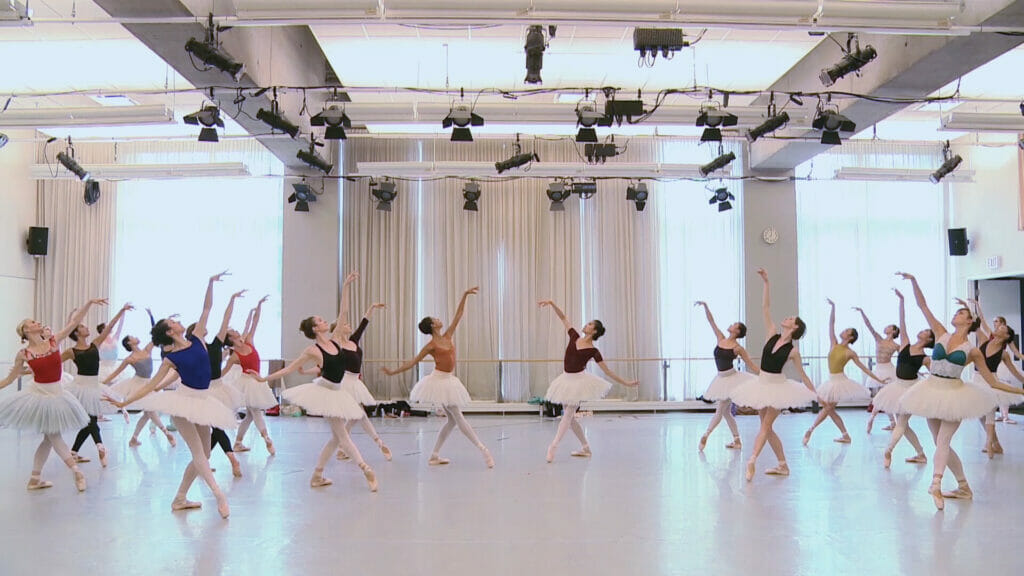Read also:
How to Watch FX Live Without CableHow To Watch AMC Without CableHow to Watch ABC Without CableHow to Watch Paramount Network Without CableThe rerelease of Talking Heads’ iconic concert film is a delight for even casual fans.
This piece was written during the 2023 WGA and SAG-AFTRA strikes. Without the labor of the writers and actors currently on strike, the works being covered here wouldn’t exist.
The focus of Swan Song, the new film from Chelsea McMullan, is Karen Kain, a ballerina whose illustrious career as a principal dancer for the National Ballet of Canada earned her worldwide acclaim. The film tells two stories that intertwine throughout, with the first recounting an incredible career that found her dancing many of the most celebrated parts in both the classical and modern repertoires. Kain worked with the biggest names in the field—even becoming the subject of an Andy Warhol portrait—before shifting into a behind-the-scenes role that allowed her to help develop and nurture new generations of dancers.
In the second, we follow her in 2021 during her final work before retirement, as she makes her directorial debut with a production of the immortal Swan Lake. This might sound like a relatively easy gig (with the exception of The Nutcracker, it is probably the most familiar of ballets), but instead of simply cruising through it, Kain has elected to present a decidedly feminist take on the material, focusing on the female characters and their determination to break free of the shackles of male domination. This is not as easy as it sounds, of course, and we watch as Kain tries to make her vision come to life in the face of such obstacles as COVID delays (this retirement was supposed to have taken place two years earlier) to a recalcitrant lead ballerina who questions her at every turn to costumes that occasionally run the risk of injuring the already exhausted dancers.
Although the portion of the film recounting Kain’s incredible past is undeniably interesting, it’s the chronicling of her Swan Lake production from early rehearsals to opening night that proves to be the most fascinating moments. There have been plenty of ballet-related films over the years, but with the exception of Robert Altman’s The Company (whose star, one-time dancer Neve Campbell, serves as one of the executive producers), there are few that give a more incisive and penetrating look at the day-to-day existence of a dance company trying to put a show together. In addition to following Kain as she goes about the Herculean task of presenting such a familiar show in a fresh and daring manner (one that runs the considerable risk of ending her career on a disastrous note), we’re also introduced to the other participants, ranging from the dancers to choreographer Rob Binet, and get to see how the show evolves from their perspective as well.

Obviously, Swan Song is a must-see for anyone with an interest in dancing, but even those with no working knowledge of it will be impressed with the amount of effort and tenacity that goes into producing a show like this and astonished with the seeming effortlessness on display when it all comes together in the end. As both a chronicle of people coming together in the hopes of putting on a show against seemingly insurmountable odds, and as a celebration of the life and work of Karen Kain, the film is an unabashed triumph.
Margareth Olin’s Songs of Earth is certainly an oddity—an undeniably intimate documentary that nevertheless needs to be seen on the largest screen imaginable. Olin’s subjects are her parents, 84-year-old father Jorgen and 75-year-old mother Magnhild, both of whom reside in the same remote area of Norway’s Oldedalen Valley where they’ve lived their entire lives. Broken up into individual sections, Olin captures her parents telling stories about their lives and the history of their community while also musing on love, nature and death, even sharing a few songs and poems. In between these talks, we are treated to spectacular footage of the area—courtesy of DP Lars Erlend Tubaas Oymo and his army of cameramen—that convey both the irresistible beauty and unavoidable danger presented by nature (in one particularly grim moment, we hear the story of an avalanche that wiped out virtually an entire community in a matter of minutes).
On paper, this may not sound particularly exciting, but the on-screen results are undeniably compelling. Olin’s parents make for fascinating subjects. Both are natural storytellers, and listening to them contemplate their lives, their thoughts on what might happen after they pass on and their own personal relationships with nature are engaging and quietly thought-provoking. As for the footage of the Oldedalen Valley, it’s absolutely breathtaking to behold. Of course, there is the implicit message that such beauty is in danger from the threat of global warming, as illustrated by wince-inducing shots of chunks of glaciers breaking away and falling into the ocean. But oddly enough, Olin still manages to find a way of ending her film on a note of actual hope. Songs of Nature may be a personal story, but the thoughts and ideas that it conveys are timely, universal and eminently watchable.

One of the most anticipated events at this year’s festival (arguably this season’s most anticipated film/music event until Taylor Swift decided to throw her hat into the ring) was the premiere of a newly restored version of the classic Talking Heads concert film Stop Making Sense, followed by a reunion of all four members of the famously fractious group for a post-screening Q&A moderated by Spike Lee. The entire event was simulcast at IMAX theaters throughout North America (apparently scoring the highest grosses ever for an IMAX special event) in anticipation of an exclusive release in the format beginning September 22nd, and followed by a general reissue a week later.
Stop Making Sense is generally regarded as the greatest concert film ever made, and while it’s possible to quibble with that designation (I might go for The Last Waltz myself), it remains one of the most exhilarating moviegoing experiences of all time. Of course, the music is spectacular (Byrne has always been a strangely compelling of frontmen) and the augmented band rocks with such precision and energy that it is almost impossible to believe that they would fold just a few years later. The eye-popping IMAX presentation makes you feel at times as if you’re among the lucky throngs at the Pantages Theater when the film was shot in 1983. But what is most impressive is how the crystal-clear visuals allow for better recognition of how the late great Jonathan Demme was able to depict a genuine sense of community amongst the players as they play and sing their hearts out with unbridled joy. Unlike most concert films, which tend to be little more than the cinematic equivalent of a tour T-shirt, Stop Making Sense has a charm and energy that continues to resonate 40 years later, and will continue to do so for a long time to come.
While the film itself remains an unquestioned triumph, the same cannot quite be said of the much-anticipated post-screening Q&A with the band (in their first public reunion since their Rock and Roll Hall of Fame induction in 2002) and Lee. Although the press buildup to this screening emphasized that the former Heads now get along fine after years of not-so-secret acrimony, there was still an unmistakable aura of tension among them. Byrne (dressed in a blue suit that set him apart from his black-clad band mates) tossed off a few practiced anecdotes while bassist Tina Weymouth looked as if she wanted to be anywhere else but there at that moment.
At least some of that was probably to be expected, but the real surprise was how ineffective Lee proved to be as a moderator. Despite having directed a concert film starring Byrne (the glorious American Utopia), Lee mostly threw out the kind of softball questions that any anonymous moderator would have gone with and, at a couple of odd points, seemed to simply blurt out what sounded like note card prompts like “Fat suit!” before finally turning it over to questions from the audience. Yet, not even this strangely deflating Q&A could begin to dissipate the sense of pure joy and elation that Stop Making Sense inspires in viewers, no matter how many times they have seen it over the years.